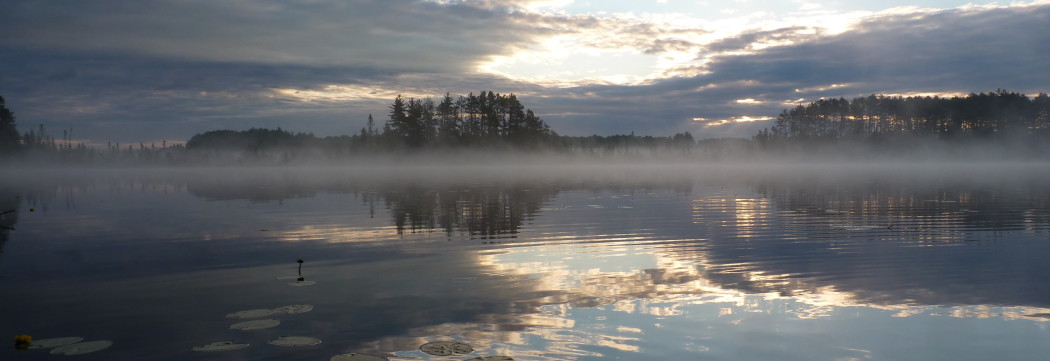Guardian Yearlong post originally published 6/30/13
I just left the Guardian trainees’ new camp, which is on a wooded bank overlooking upper Eagle River. While I’m here in the wilderness, I’m taking advantage of some time alone in my canoe by voice recording this first blog entry. However, just as I begin, a whirlwind whips the water right in front of me into a fierce lather. At first I can’t make sense of it—all I can imagine is several fish flopping around like crazy. And then I see that some other energy is spinning it in a tight counterclockwise circle, with a sound like a fan on overdrive.
As soon as I realize what it is, it dissipates and transforms into a cool gust of wind that passes over me. And then it is over.
I witness waterspouts when there is magic afoot. And that is surely the case today. It all began in the deep black of the predawn, when I arose, grabbed my drum, and felt my way up the trail to Mashkodens (Little Prairie Camp). Mist rose in soft swirls from the surface of the pond that I skirted quietly by so as not to disturb the nocturnal animals returning home to bed down for the day. As well, the first of the diurnal (daytime) animals might already be stirring.
I arrived at Mashkodens just as a couple of the trainees were waking up. Giving them some time to rouse their comrades and get ready, I walked out on the meadow. The frosty night air had transformed the vegetation into a crystal-covered carpet that shimmered ghostly white in the faint starlight.
It must have been about a mealtime before first light, because Robins and White-Throated Sparrows, the first voices of the dawn chorus, were just warming up. Before that, it was just frogs and the occasional honk of a nervous Goose. Next I heard a Chickadee, and then another and another, spread out around me. From high on a dead branch a Mourning Dove joined in, followed by a Hermit Thrush, a Wood Thrush, and a Veery. Then came the Warblers, and finally a Red-winged Blackbird heralding the first light creeping over the horizon.
But that was hardly the end, for then followed “the bedlam of other singers,” as Aldo Leopold noted in A Sand County Almanac. There was such a plethora of whistles, shrieks, quacks, and assorted voicings that it was impossible to distinguish most of them from each other.
It was cold for a mid-June morning, yet I was warm from the walk and glowing inwardly with anticipation for the coming rite of passage. I passed the time reflecting on how the sequence of birds joining the dawn chorus can vary with time of season, and from one place to another, depending on species composition, geography, and forest type.
Last evening the trainees finished their pack frames—a noteworthy event, as these were no ordinary frames. The Guardian Training is a completely nomadic experience: once the trainees leave Mashkodens, they will not see another camp for the entire time. On those pack frames they will be carrying their shelters, clothing, bedding, tools, and craft supplies—everything they will need for their wandering life. For them, no two days will be the same. They will be in constant training to adapt and adjust to whatever lies around the next turn of the trail. Aware of the significance and symbolism of their pack frames, they turned out some of the best I have seen from any group.
Soon after my arrival, the drum called everybody together and the pungent smell of burnt hair filled the air. Whether it be graceful locks of long blonde hair, wavy shocks black as raven feathers, or sandy colored dreadlocks, they all burned off the same and lay in piles beside heads encrusted in charred stubble. Glowing-hot rocks and coals gripped in wooden tongs were deftly run over heads, along with flaming sticks to set small patches of hair afire. Handfuls of wet moss stood at the ready to immediately snuff out flare-ups. Along with this singeing, they blackened their faces with charcoal.
You may be wondering why such self-defacement. The trainees actually saw it as the opposite: they planned and conducted the ceremony as a symbolic release from their attachment to images of self that were not authentically them. They wanted to consciously break from that past and create space for their essential selves to shine forth.
With faces smudged and hair reduced to bristle, they left Mashkodens in silence, never again to set foot in the camp where they met shared many fond moments while preparing for their wandering turn of the seasons in the wilderness. Hiking to the nearest stream, they took to their canoes, paddled for a mealtime or so, and stopped to wash themselves clean and ready for their awakening.
After having fasted for two days and gotten up in the predawn for the ceremony, they were more than tired when they found a campsite in the early evening. With relish, they roasted fish, greens, and bear fat on an open fire, and then slept soundly under a canopy of stars. The next day, those who needed more rest stayed around camp to gather firewood and forage (escargot was on the dinner menu), while those with passion and energy organized scouting missions to find canoe routes through the wilderness that lied ahead, and to assess the difficulty of upcoming rapids.
